Can Cats Eat Chicken Nuggets? A Comprehensive Guide
We all know that Chicken Nuggets are a type of fast food famous for their delicious taste. But can cats eat chicken nuggets safely?
This question is not only of yes or no because the food that is best for humans perhaps may not be safe for cats, speedy food,
In this guide, we will discuss cats and chicken noodles and the health impacts ( Risks and Benefits ) of chicken nuggets on cats. As well as we will discuss more relevant questions about cats and chicken nuggets. So let’s get begin together.
Chicken Nuggets Are Made Of?
Chicken nuggets are usually made from small pieces of chicken meat that are breaded, fried, or baked. The chicken used can vary, but it’s often a combination of white and dark meat.
Additionally, bread-making mixes may contain various spices and additives to enhance flavour. Chicken nuggets are a popular fast food item that many people enjoy, but it’s important to consider whether or not they’re suitable for your cat’s diet.
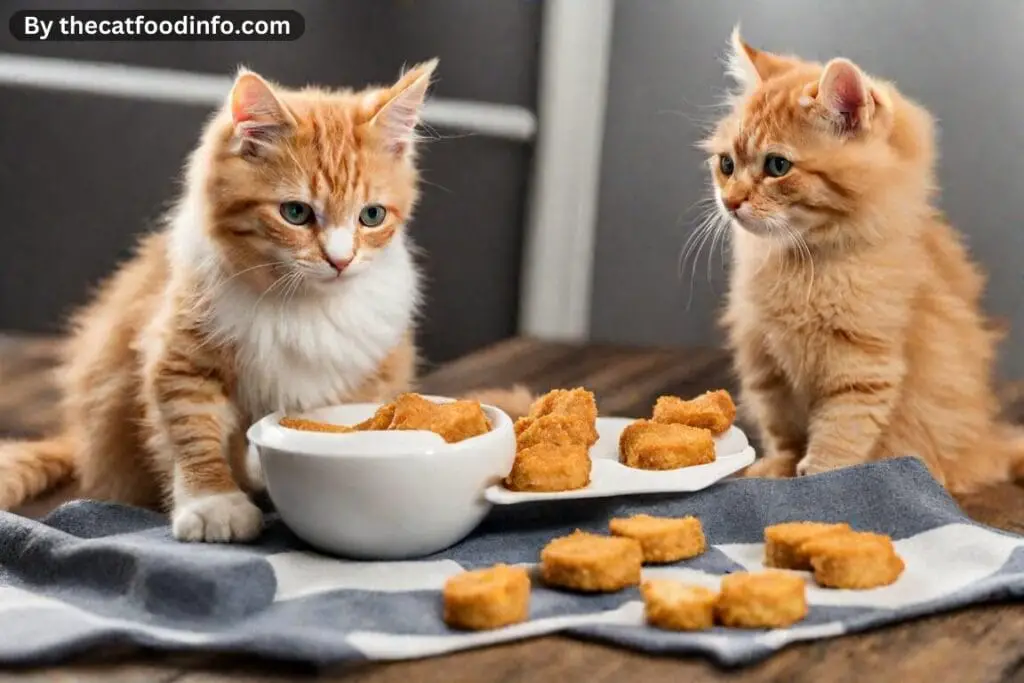
Can Cats Eat Chicken Nuggets?
Yes, cats can technically eat chicken nuggets, but it’s not recommended for several reasons. Although chicken is a protein source commonly found in cat food, preparing chicken nuggets, including the breading and frying process, introduces additional ingredients and cooking methods that may not be suitable for cats.
Cats have specific nutritional needs that differ from humans, and eating foods like chicken nuggets, which are often high in fat, salt, and artificial additives, can cause digestive problems or nutritional imbalances.
Additionally, breading on chicken nuggets can be difficult for cats to digest and can cause gastrointestinal upset. So, while a bit of taste of chicken nuggets may not harm your cat, it’s best to stick to a balanced diet that’s specifically formulated for their nutritional needs.
Health Risks Of Chicken Nuggets To Cats
1. Digestive Upset:
Chicken nuggets are often high in fat and grease, which can be difficult for cats to digest. This can cause symptoms such as vomiting, diarrhoea, abdominal pain, and discomfort. Digestive disorders can disrupt a cat’s regular eating habits and may require veterinary intervention.
2. Obesity:
Obesity is a significant concern in cats, and feeding them high-calorie, high-fat foods such as chicken nuggets can lead to weight gain. Excess weight stresses a cat’s joints and organs and increases the risk of other health conditions such as diabetes, arthritis and heart disease.
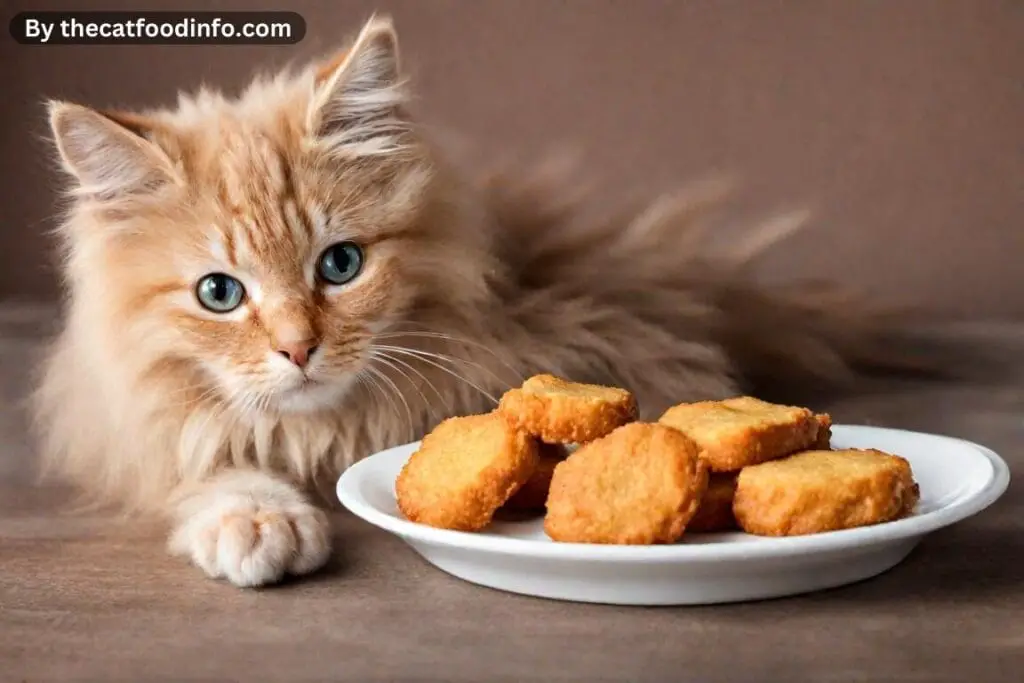
3. Pancreatitis:
Pancreatitis is a painful pancreas inflammation that can occur when cats eat a high-fat diet. Chicken nuggets, with their fried coating and fatty content, can trigger this condition, causing symptoms such as vomiting, diarrhoea, lethargy and abdominal pain. Severe cases of pancreatitis require intensive veterinary care.
4. Nutritional Imbalance:
Cats have specific nutritional needs that differ from humans. Although chicken is a protein source commonly found in cat food, chicken nuggets lack essential nutrients such as taurine, which is vital for heart health and vision. Eating chicken nuggets regularly can lead to nutritional deficiencies and long-term health problems.
5. Allergic Reactions:
Chicken nuggets contain various ingredients, including wheat, soy, and artificial preservatives, which can trigger allergic reactions in cats. Allergies can manifest as skin problems (itching, redness, or hair loss) or digestive problems (vomiting, diarrhoea, or excessive gas). To reduce the symptoms, it is crucial to identify and eliminate allergens from the cat dose.
6. Sodium Intake:
Excessive sodium intake can lead to electrolyte imbalance and dehydration in cats. Chicken nuggets are often high in salt, which can stress a cat’s kidneys and raise blood pressure. Long-term exposure to high amounts of sodium can contribute to kidney disease and other health complications.
7. Dental Issues:
The crunchy texture of chicken nuggets can contribute to dental problems in cats, such as tartar build-up, tooth decay and gum disease. Biting hard or sticky foods can cause enamel wear and lead to painful dental conditions that require veterinary treatment, including tooth extraction.
8. Choking Hazard:
The small size and irregular shape of chicken nuggets can pose a choking hazard for cats, especially if they try to swallow large pieces whole. Choking can result in respiratory distress and may require immediate intervention to relieve the obstruction and restore normal breathing.
9. Digestive Blockages:
Large chunks of bread crumbs or chicken nuggets can get lodged in the cat’s stomach, causing obstructions to the passage of food and waste. Digestive obstructions are medical emergencies that require immediate veterinary attention and may require surgery to remove the obstruction and restore digestive function.
10. Bacterial Contamination:
Chicken nuggets can become contaminated with harmful bacteria such as salmonella or E. coli during processing, handling, or storage. Cats are prone to foodborne illnesses caused by bacterial contamination, which can cause vomiting, diarrhoea, fever and lethargy. Severe cases may require antibiotic treatment and supportive care to manage symptoms and prevent complications.
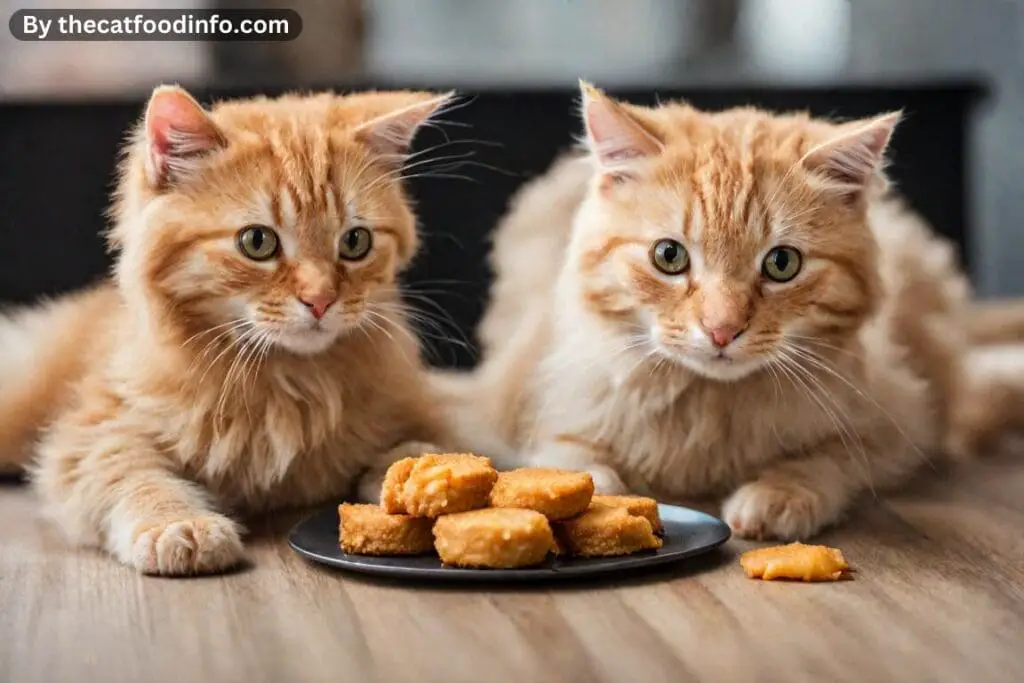
11. Metabolic Disorders:
Feeding cats chicken and carbohydrate-rich foods, such as chicken nuggets, can disrupt their metabolism and lead to metabolic disorders such as hyperlipidemia (blood lipids) or fatty liver disease (hepatic lipidosis). These conditions can have severe consequences for the cat’s overall health and may require dietary changes and medical intervention to manage effectively.
12. Decreased Appetite for Balanced Meals:
Regular use of chicken nuggets as a cure can reduce a cat’s balanced, nutritious cat food appetite. Over time, it can lead to nutritional deficiencies, as the cat does not get the necessary vitamins, minerals and nutrients for maximum health. Encouraging cats to eat a diverse and balanced diet is essential for their health.
13. Behavioral Changes:
Chicken nuggets can affect some of the extra and prostitute cat behaviour commonly found in processed foods like chicken nuggets and contribute to hypertension, aggression or mood changes. Cats can also be more demanding or selective in their diet priorities, making it difficult to provide a nutritious diet that meets their needs.
14. Increased Risk of Diabetes:
The high carbohydrate content of chicken nuggets bread can contribute to insulin resistance in cats, increasing their risk of developing diabetes. Diabetes can lead to serious health complications, including nerve damage, kidney disease, and vision problems, and requires lifelong management with insulin therapy and dietary control.
15. Reduced Lifespan:
Constantly feeding chicken nuggets to cats can hurt their health and overall lifespan. A combination of malnutrition, obesity, metabolic disorders, and other health complications associated with consuming inappropriate foods can significantly reduce a cat’s quality of life and longevity. Providing cats with a balanced and species-appropriate diet is essential to promoting their health and well-being.
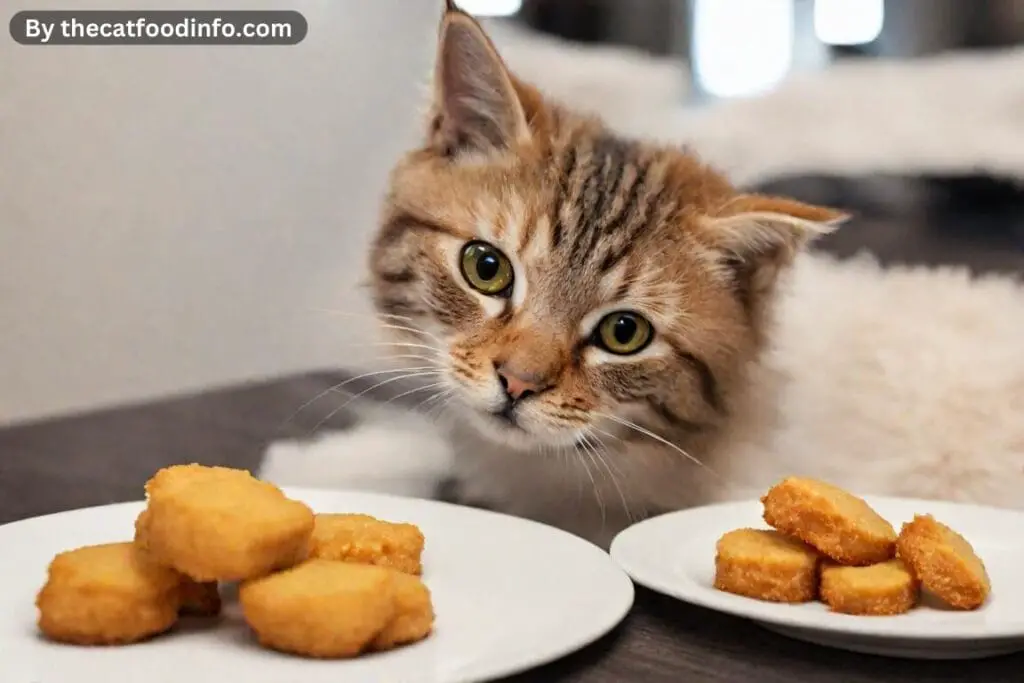
Does Chicken Nuggets Provide Any Benefits To Cats?
Here are some potential benefits of chicken nuggets for cats, although it’s important to note that the risks generally outweigh these:
1. Protein Source:
Chicken nuggets contain chicken meat, which is a good source of protein for cats. Protein is essential to maintain muscle mass, support immune function, and promote overall cat health.
2. Palatability:
Some cats may find the taste and texture of chicken nuggets appealing, making them an attractive treat or food option for picky eaters. Offering a variety of food textures and flavours can help encourage cats to eat the right amount of food.
3. Variety:
Introducing new foods, such as chicken nuggets, can add variety to a cat’s diet, which can help prevent boredom and increase interest at mealtime. Offering fresh food or treats occasionally can improve the cat’s eating experience and provide mental stimulation.
4. Source of Calories:
For cats with high energy needs or cats struggling to maintain weight, chicken nuggets can provide a calorie-dense option to supplement their regular diet. However, ensuring a cat’s nutritional needs is crucial, as chicken nuggets alone cannot provide a balanced diet.
5. Bonding Opportunity:
Feeding chicken nuggets to cats can have a relationship between pet owners and their colleagues. Sharing food can strengthen the relationship between humans and animals and have a positive relationship over time of eating.
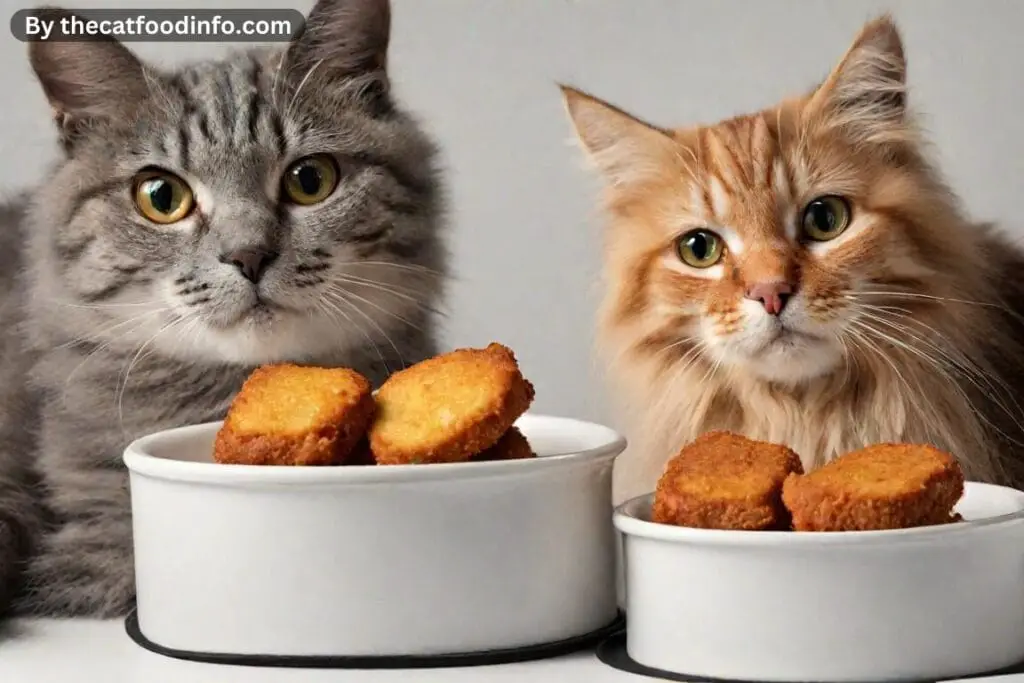
6. Convenient Treat Option:
Chicken nuggets are readily available and accessible, making them an easy treat option for pet owners. However, they must be consumed in moderation and as part of a balanced diet to prevent health problems associated with overconsumption.
7. Dietary Variety for Picky Eaters:
Some cats may have specific preferences or dietary restrictions that make it challenging to find a proper dose. Chicken nuggets can offer an alternative option for picked foods or cats’ sensitivity, though they should be introduced slowly and in small quantities to monitor adverse reactions.
8. Quick Energy Boost:
In certain situations, such as during recovery from illness or surgery, serving chicken nuggets as a high-calorie snack can give cats quick energy to help them recover. However, consultation with a veterinarian is essential to meet a cat’s nutritional needs appropriately.
9. Encourages Socialization:
Hand-feeding cats chicken nuggets or interactive toys can encourage socialisation and promote positive behaviour. Engaging in food-related activities with cats can build trust and strengthen the bond between pet owners and their companions.
10. Indulgence or Special Occasions:
Occasionally, offering chicken nuggets as a special treat on birthdays, holidays, or other celebratory occasions can add excitement and joy to a cat’s life. However, limiting these indulgences and prioritising the cat’s long-term health and well-being is essential.
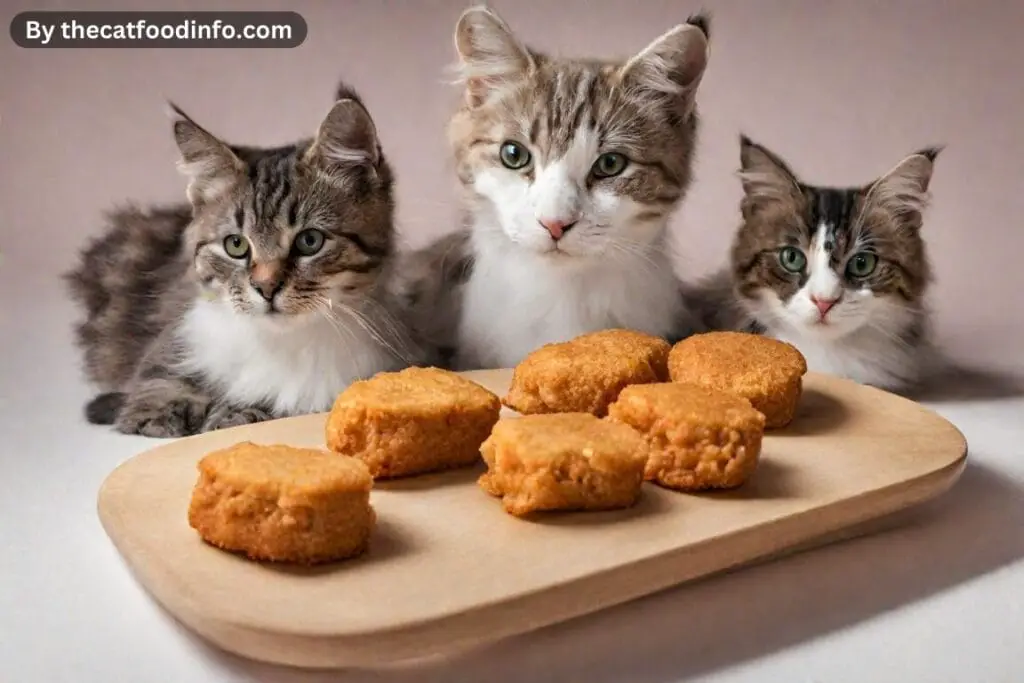
How Can You Stop Your Cat From Eating Chicken Nuggets?
Here are steps you can take to stop your cat from eating chicken nuggets:
1. Remove Access to Chicken Nuggets:
The first step in preventing your cat from eating chicken nuggets is to remove access to them. Store all human foods, including chicken nuggets, in securely sealed containers or high cupboards out of your cat’s reach.
2. Store Food Safely:
Ensure all chicken nuggets and other human treats are stored safely in the refrigerator or freezer to prevent your cat from scavenging them in the kitchen or trash can. Use airtight containers or reusable bags to store leftovers and dispose of food scraps quickly.
3. Monitor Meal Preparation:
Be vigilant when preparing and eating so your cat doesn’t steal chicken nuggets or other food items from countertops, tables or plates. To reduce temptation, keep your cat away from the kitchen or dining area during mealtimes.
4. Offer Healthy Alternatives:
Provide your cat with nutritious and species-appropriate foods and snacks to satisfy their cravings and prevent them from reaching for unhealthy options like chicken nuggets. Offer treats to cats or small pieces of cooked chicken or fish as occasional rewards.
5. Feed Regular Meals:
Ensure your cat receives balanced and nutritious cat food regularly to meet their nutritional needs and prevent littering behaviour due to hunger. Stick to a consistent feeding schedule and avoid free feeding to discourage foraging behaviours.
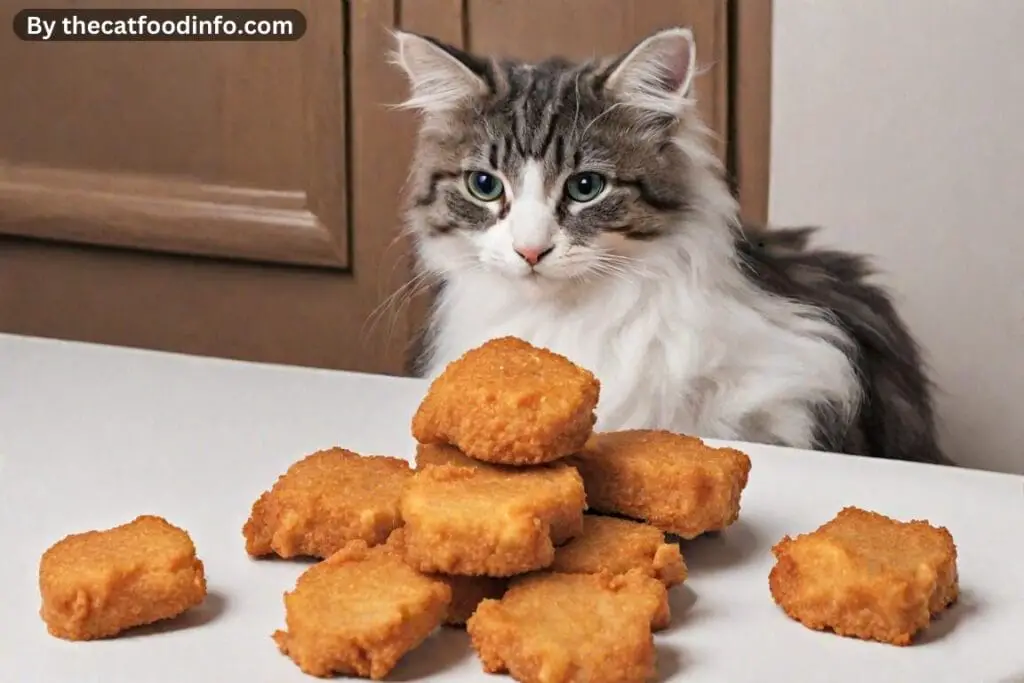
6. Use Deterrents:
To prevent your cat from reaching the places where chicken nuggets are stored or used, such as motion-activated alarm, lemon aroma spray or bilateral tape. These obstacles create a negative relationship with behaviour and can help change your cat’s behaviour over time.
7. Train Behavior:
Train your cat using positive reinforcement techniques to discourage food-seeking and encourage desired behaviours, such as avoiding human food. Reward your cat with praise, treats, or playtime when they demonstrate appropriate behaviour around food.
8. Create Environmental Enrichment:
Provide your cat with environmental enrichment activities such as interactive toys, puzzle feeders and vertical climbing structures to keep them mentally and physically active. Engaging your cat in play and enrichment activities can reduce boredom and prevent it from seeking inappropriate food.
9. Supervise Outdoor Access:
If your cat has outdoor access, monitor their outdoor activities to prevent them from throwing food scraps or litter into the neighbourhood. Consider installing a secure outdoor enclosure or cattery to provide your cat with a safe and stimulating outdoor environment.
10. Seek Veterinary Advice:
If your cat continues to show food search behaviour despite your efforts to discourage it, consult your animal doctor for further guidance. Your doctor may reject primary medical conditions and provide personal recommendations to manage your cat’s behaviour effectively.
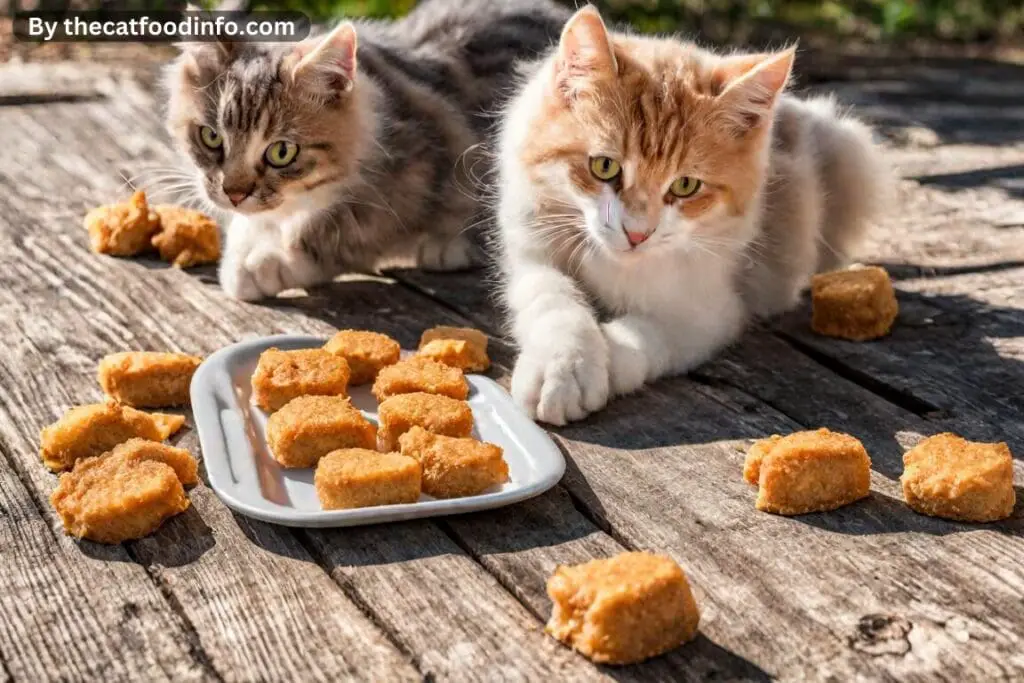
What You Should Do If Your Cat Overeats Chicken Nuggets?
1. Assess the Situation:
Start by assessing the severity of the situation. If your cat has eaten a small amount of chicken nuggets, keep a close eye on their behaviour and symptoms for any signs of distress or distress. However, if your cat has ingested a large amount or shows immediate signs of illness, contact a veterinarian immediately.
2. Monitor Symptoms:
Keep a keen eye on any digestion in your cat, such as vomiting, diarrhoea, cheapness, abdominal pain, or changes in behaviour. Note any unusual symptoms or behaviours and contact your animal doctor if you have concerns about your cat’s health.
3. Provide Access to Water:
Ensure your cat has access to fresh water to help flush excess salt or fat from their system and prevent dehydration. Encourage your cat to drink by placing multiple water bowls around the house and offering wet or water-rich food.
4. Limit Food Intake:
Temporarily limit your cat’s food intake, allowing their digestive system to rest and recover. Offer small amounts of light, easily digestible food such as plain cooked chicken or rice, or consult your veterinarian for specific dietary recommendations based on your cat’s needs.
5. Monitor Hydration:
Monitor your cat’s hydration status by checking skin elasticity and mucous membrane colour. If you notice signs of dehydration, such as sunken eyes, dry gums, or lethargy, contact your veterinarian immediately for further evaluation and treatment.
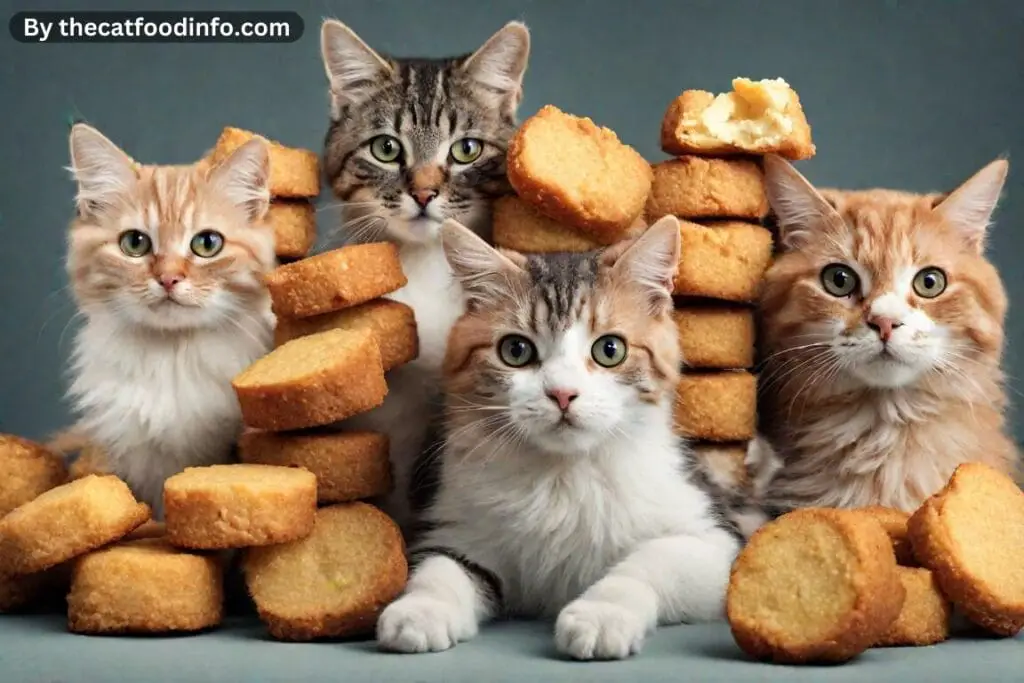
6. Contact Your Veterinarian:
If your cat shows signs of illness or discomfort after overeating, contact your animal doctor for advice. Be prepared to provide details about the amount and type of chicken nuggets and changes in any symptoms or behaviour seen since the inception.
7. Follow Veterinary Recommendations:
Follow your veterinarian’s recommendations for monitoring your cat’s condition and providing supportive care at home. Your vet may recommend additional diagnostic tests or treatments depending on the severity of your cat’s symptoms and overall health.
8. Prevent Future Incidents:
Take steps to prevent future incidents of overeating chicken nuggets or other human foods by ensuring all food items are safely stored and inaccessible to your cat. Monitor food preparation and consumption to prevent your cat from accessing food scraps or leftovers.
9. Educate Household Members:
Educate everyone in the household about the importance of keeping human food away from pets and the potential dangers of feeding cats improperly. Establish clear guidelines for food handling and storage to prevent accidental pet ingestion.
10. Seek Professional Help:
If your cat’s symptoms remain intact or worse despite home care efforts, get help from a professional veterinarian immediately. Your Pashtun can provide a thorough inspection, proper treatment, and further guidance to effectively handle your cat’s condition.
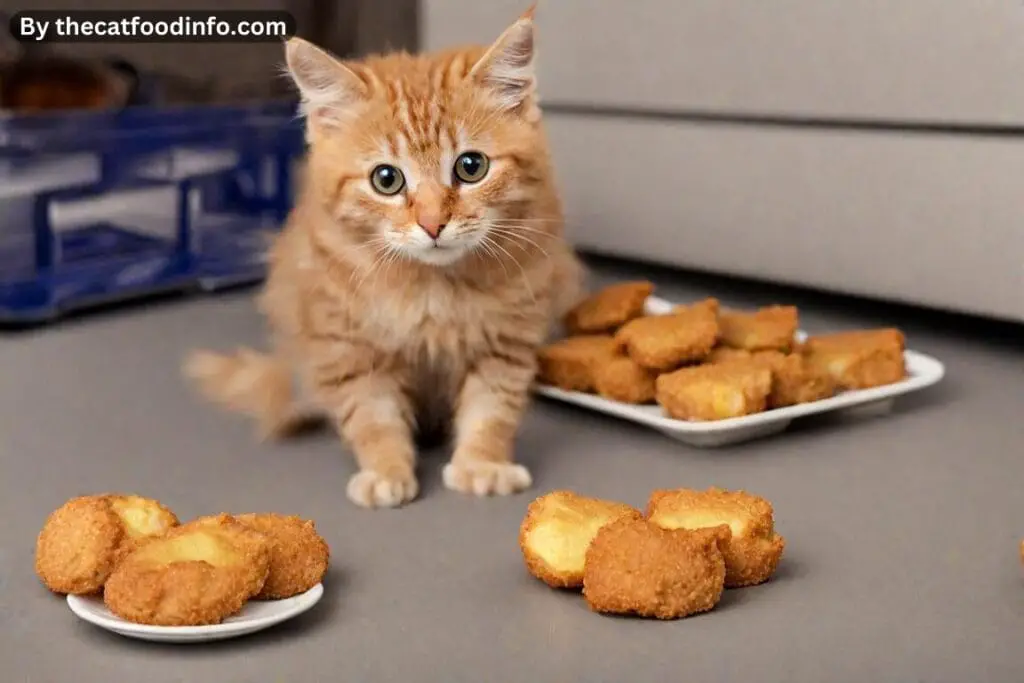
How Can You Feed Chicken Nuggets To Your Cat Safely?
1. Consult with Your Veterinarian:
Before considering feeding your cat, consult your veterinarian to determine if it is safe and appropriate for your cat’s nutritional needs and health status. Your doctor can provide personalised recommendations based on age, weight and underlying medical conditions.
2. Limit Quantity and Frequency:
Suppose your veterinarian approves of feeding your cat chicken nuggets. In that case, do so in moderation and limit the amount and frequency of chicken nuggets rather than making them an occasional part of their diet to avoid overconsumption and excessive calories. Potential health risks associated with fat intake can be prevented.
3. Choose Plain Chicken Nuggets:
Choose plain chicken nuggets without any breading, seasoning or sauce, as these added ingredients may include spices, herbs or additives that could harm your cat’s health. If you’re considering serving chicken to your cat, plain, cooked chicken breast or thigh meat is a safe option.
4. Remove Breading:
If you feed your cat chicken nuggets with breading, remove the breading before serving the chicken to your cat. Bread can be difficult for cats to digest and cause indigestion or gastrointestinal problems.
5. Cook Thoroughly:
Ensure the chicken nuggets are thoroughly cooked to kill any potential bacteria or pathogens that could cause foodborne illness in your cat. Cooked chicken must reach an internal temperature of at least 165°F (74°C) to be safe for consumption.
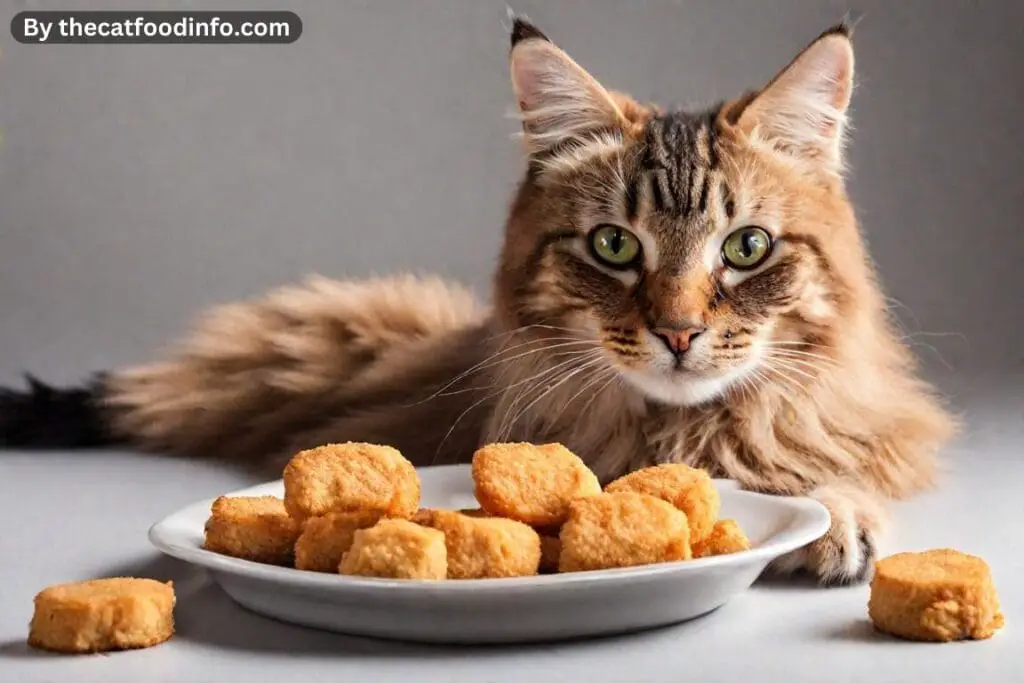
6. Cut into Small Pieces:
Cut chicken nuggets or meat into small, bite-sized pieces that are easy for your cat to chew and swallow. This can help prevent choking and make the food more accessible for your cat to digest.
7. Monitor for Adverse Reactions:
After feeding your cat chicken nuggets, monitor them closely for any adverse reactions or signs of digestive upset, such as vomiting, diarrhoea, lethargy, or changes in behaviour. Stop feeding chicken nuggets and contact your veterinarian for guidance if you notice any symptoms.
8. Offer Fresh Water:
Always provide your cat with fresh, clean water and food, including chicken nuggets. This helps ensure your cat stays hydrated and can help flush excess salt or fat from his system.
9. Be Mindful of Overall Diet:
Consider the overall balance of your cat’s diet when offering chicken nuggets as treats. Ensure they get a nutritionally complete and balanced diet from their regular cat food to meet their essential nutritional needs.
10. Consider Alternatives:
Explore alternative treatment options explicitly formulated for cats and provide nutritional benefits without the potential risks of feeding human foods such as chicken nuggets. Your veterinarian can recommend appropriate treatment options for your cat’s dietary needs.
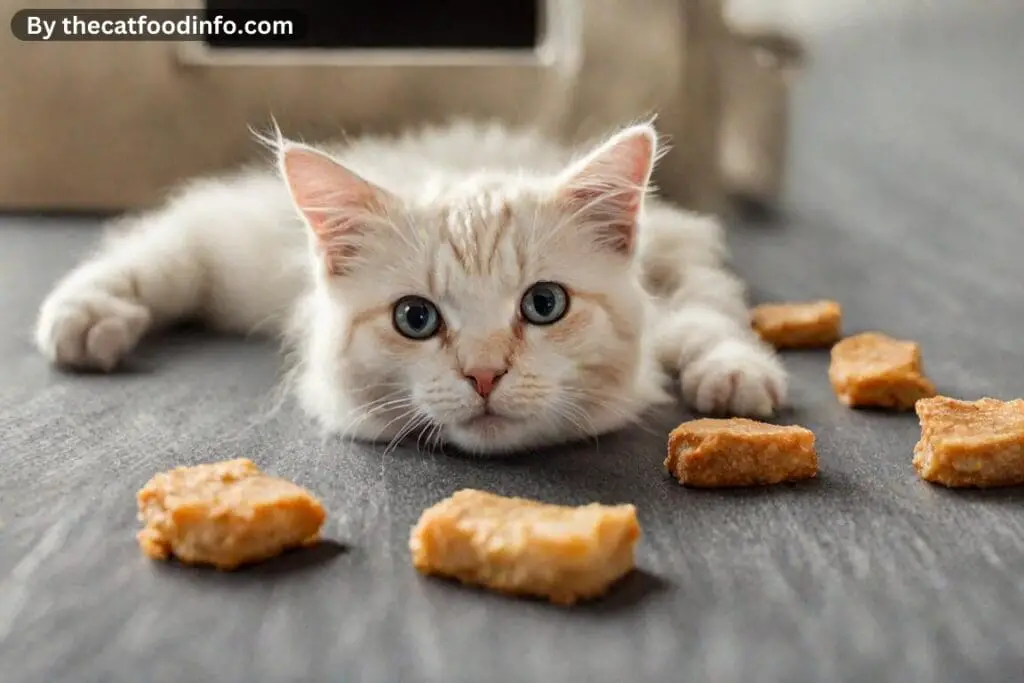
Can Chicken Nuggets Kill Cats?
Yes, chicken nuggets can kill cats if eaten in large quantities or contain harmful ingredients such as onion, garlic, or certain toxic spices. Additionally, the high fat and salt content of chicken nuggets can cause digestive disorders, pancreatitis, obesity, and other serious health problems in cats if consumed regularly or in excess.
Therefore, it is essential to prevent cats from having access to chicken nuggets and provide them with a balanced and nutritious diet according to their needs. If you suspect your cat has eaten chicken nuggets or is showing signs of illness after eating them, consult a veterinarian immediately for proper diagnosis and treatment.
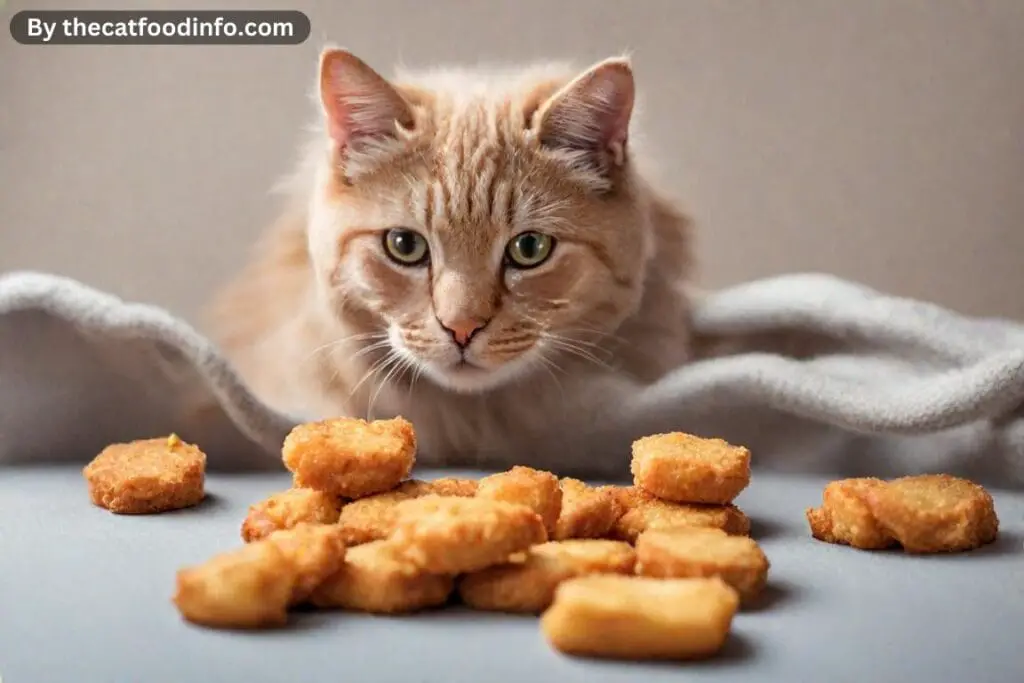
Conclusion
Finally, although cats can technically eat chicken nuggets, it is not recommended due to several health risks. Chicken nuggets are usually high in fat, salt, and artificial additives, which, if eaten regularly or in large amounts, can cause indigestion, obesity, pancreatitis, and other serious health problems in cats.
You must prioritise your cat’s health and provide them with a balanced and nutritious diet tailored to their needs. Avoiding human treats like chicken nuggets and offering appropriate cat food and snacks can help keep your friend healthy and happy.
If your cat accidentally eats chicken nuggets or shows signs of illness after eating them, consult a veterinarian immediately for proper diagnosis and treatment. Limiting access to chicken nuggets and other human foods and providing veterinary-approved diet options can help your cat stay safe and thrive for years.
FAQs
Can Cats Eat Chicken Nuggets In Small Amounts?
Yes, but it’s not recommended.
Can Cats Eat Chicken Nuggets Every Day?
Feeding cats chicken nuggets daily is not recommended due to potential health risks.
Can Other Pets Eat Chicken Nuggets?
Other pets may eat chicken nuggets, but moderation and consideration of their dietary needs are essential.
Can Chicken Nuggets Cause Digestive Issues?
Chicken nuggets can cause digestive issues in some pets.



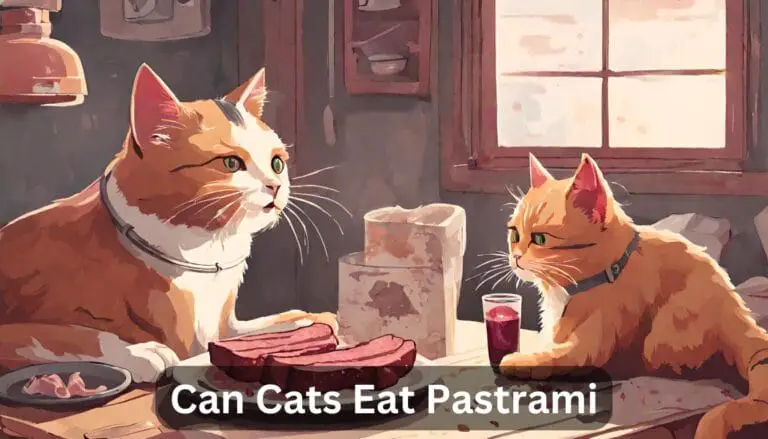

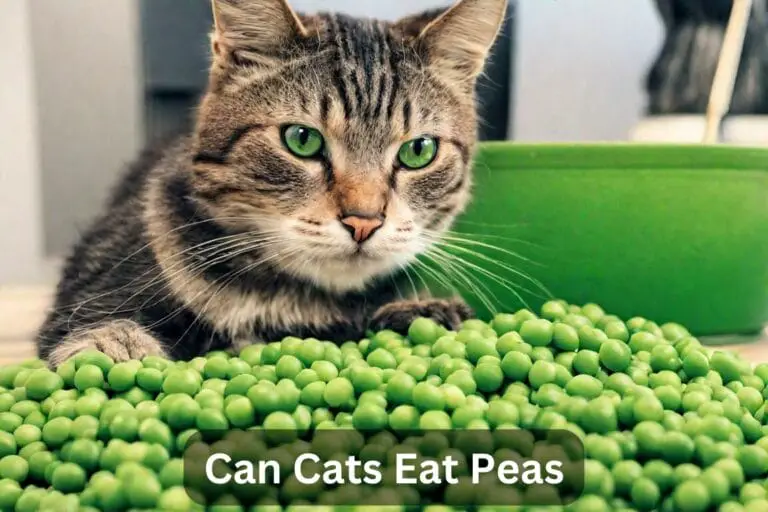
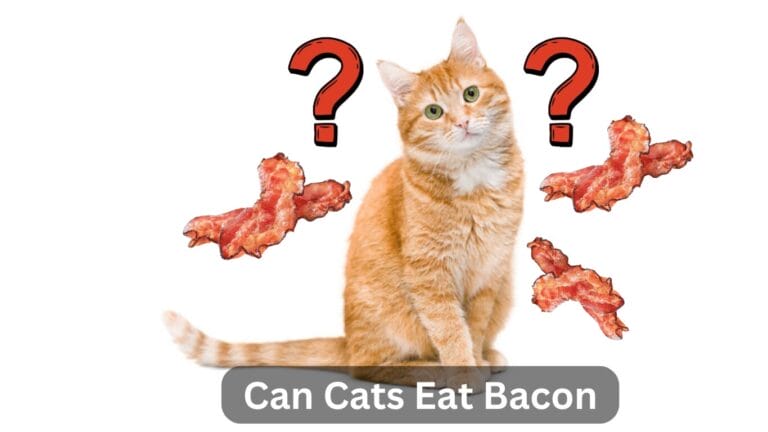
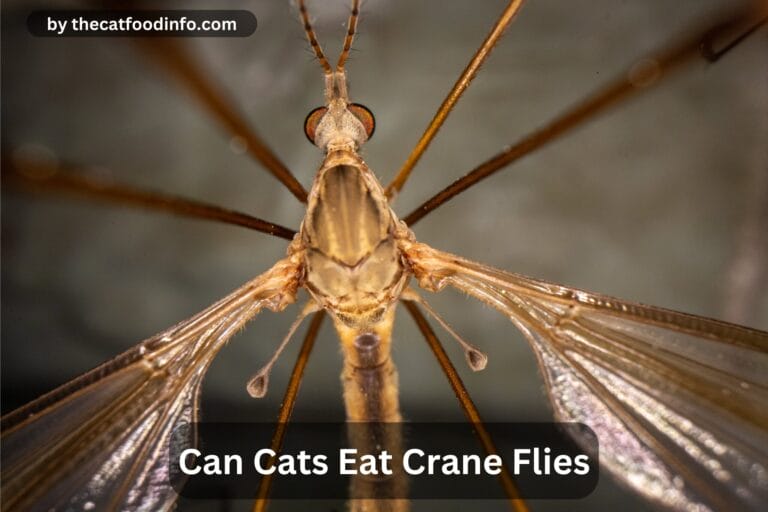
4 Comments